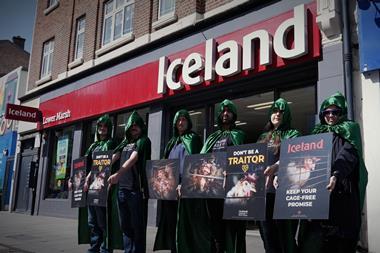
Over half of Pancake Day egg buyers would leave a shop and go elsewhere if higher welfare choices weren’t available, a new RSPCA Assured survey has revealed.
The study, carried out by YouGov for the assurance scheme, found that 61% of adults would either go elsewhere or refuse to buy eggs altogether if eggs from cage-free hens were not available.
It also found that 78% of respondents who buy animal products also said they thought their shopping choices could make a positive difference to the lives of farmed animals.
“We’re fast approaching Pancake Day – one of the biggest egg-eating days of the year – so it’s really reassuring that a high number of consumers are voting with their feet and refusing to buy eggs that have come from caged hens,” said Kelly Grellier, chief commercial officer at RSPCA Assured. “However, it was disappointing to find that just over one in five people who consume animal products (22%) said a lack of available information was a barrier to buying higher welfare.”
The assurance scheme said it would be a “continual struggle” to see zero eggs from caged hens on shelves if labelling was not clear enough.
“It’s really important that labelling and point of sale signage in stores is as clear as possible about where produce on the shelves has come from,” said Grellier. “A small action like more transparent signposting could make a massive difference to the lives of millions of hens.”
Read more: Lack of government support could derail cage-free egg ambitions, report warns
According to the RSPCA Assured scheme, around eight million hens (20%) in the UK are still kept in cages that restrict their ability to move around, stay active and easily perform natural behaviours.
Being in a cage can make hens stressed and frustrated, which can lead to abnormal behaviours like birds pulling out each other’s feathers. It is also common to see bald patches from where their heads and necks have rubbed on the bars.
The majority of eggs sold in UK supermarkets are now cage-free (over 70%). RSPCA Assured is encouraging everyone who chooses to eat eggs this Pancake Day to look for cage-free – and preferably those with the RSPCA Assured label.
Supermarkets, including Aldi, Co-op, Marks & Spencer, Morrisons, Sainsbury’s and Waitrose, already only supply cage-free eggs, and a number of other retailers have also committed to becoming cage-free in 2025.
“We all have the power to help more hens live better lives by supporting the sale of higher-welfare eggs and consigning eggs from caged hens to the past for good,” said Grellier. “Consumer actions are speaking loudly and it’s time for the entire industry and all retailers to listen.”



















No comments yet